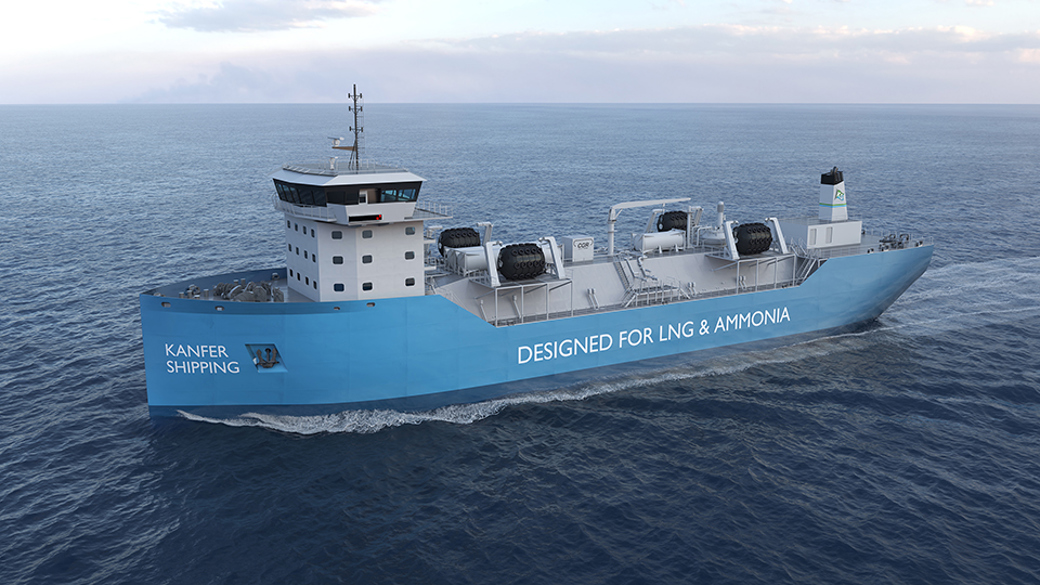
Oceania Marine Energy and Kanfer Shipping sign Letter of Intent for world’s first ammonia-ready LNG bunkering vessel in Australia
Oceania Marine Energy (“Oceania”), an Australian company focused on connecting natural resources and energy production to shipping industry, and Kanfer Shipping AS (“Kanfer”), the Norway-based shipping company focusing on small-scale LNG sea transportation and LNG bunkering have signed a Letter of Intent (LOI) to bring the world’s first ammonia-ready LNG bunkering vessel to Australia.

Oceania and Kanfer aim to build a long-term zero emission sustainable shipping industry in Australia using LNG as the transition fuel and move towards green ammonia and methanol as the targeted fuel for bunkering vessels operating in the Northwest and Eastern ports of Australia.
Oceania is progressing its LNG bunker license applications with key port authorities and is engaging in preliminary talks with Australian natural gas and green ammonia. Oceania are collaborating with energy, shipping and industry partners to realise this opportunity.
“Australia is uniquely positioned to be the world leader in providing zero-carbon fuels to the shipping industry. At Oceania, we are thrilled to be working with Kanfer Shipping to activate Australia's competitive advantage, connecting its production of sustainable energy with its position at the apex of the Asia-Pacific commodity trade route. The opportunity will drive new avenues of high-grade technical employment, while preserving our environment and ensuring future energy security,” said Nick Bentley, Director of Oceania Marine Energy.
Kanfer has an exclusive design license with CGR Arctic Marine AS, focused on enabling liquid gas transportation with the lowest possible environmental footprint and achieving zero emission marine transportation. This transition to zero emission has already started, as the vessel design utilises LNG as a fuel combined with hybrid and peak energy saving technologies from Kongsberg Maritime. With future modification, the Rolls-Royce Bergen gas engines can be converted to operate on ammonia. The vessel is designed for simplicity and can be adapted to load LNG, methanol or ammonia.
“The Northwest and Eastern regions of Australia have among the highest levels of heavy tonnage marine traffic in the world, making them ideally suited for adoption of zero emission fuels. We are very excited to work with Oceania and offer solutions for Australia to become an attractive LNG bunkering hub in the region. We strongly believe in the green/blue ammonia as a future fuel and for Australia to become a leading producer. We are proud to be part of the zero-emission marine transportation initiative and supply bunker vessels ready-made for future marine fuels,” said Mr. Stig Hagen, Managing Partner, Kanfer Shipping,
Kongsberg Maritime, with its partner Rolls-Royce Bergen Engines AS, strongly believes that LNG will play a crucial role as the world transitions to carbon neutral and zero emission shipping.
“Our LNG solution already gives a net 18% greenhouse gas (GHG) reduction (including methane slip), and it can be converted to ammonia when the technology and infrastructure are ready,” said Kjell Harloff, Senior Vice President, Engines, Kongsberg Maritime.
Mark Bell, General Manager of Society for Gas as a Marine Fuel, said: “I am pleased to see this initiative in an area that is rapidly becoming a leader in green marine fuels. Australia has the raw materials, clean fuels, and a large bulk shipping volume, all that is required for a zero emission sustainable shipping. With truly sustainable zero carbon fuels as the end game for shipping, the fuel flexibility this project offers marks the horizon as to the direction it needs to take.”
Senator Ben Small, Parliament of Australia, noted:
“Australia’s gas-fired COVID recovery, incorporating the Morrison Government’s technology-not-taxes approach to emissions reduction, is clearly paying dividends with this exciting private sector announcement. Ambition and targets in emissions reduction are one thing, but action and achievements are what count. By enabling LNG as a transition fuel, this initiative will enable shipping to reduce its carbon footprint whilst delivering jobs and economic security to our regions, which is an important element of our plan to achieve net zero.”